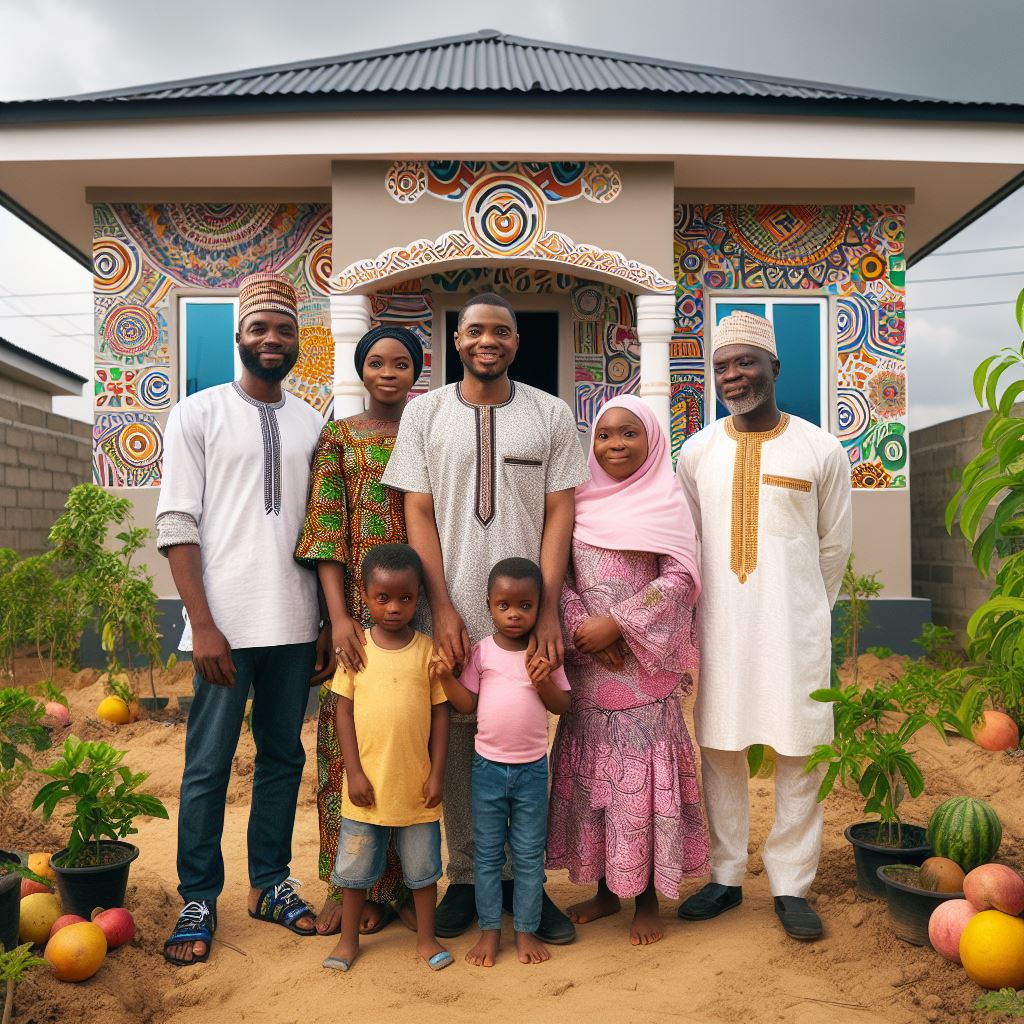Introduction
The Nigerian real estate market is a dynamic and growing industry with a wide range of options available for potential investors.
From residential properties to commercial spaces, there are numerous opportunities for individuals looking to venture into the real estate market in Nigeria.
Deciding whether to rent or own property is a crucial decision that can greatly impact one’s financial stability and long-term goals.
It is important to carefully consider the advantages and disadvantages of each option before making a final decision.
Renting a property provides flexibility and freedom for individuals who are unsure about their long-term plans.
Renting allows individuals to have a place to live without the responsibility of property ownership.
It provides the convenience of not having to worry about property maintenance or repairs.
However, renting also has its downsides. Renters do not have the opportunity to build equity or invest in an asset.
Additionally, rental prices can increase over time, making it less financially beneficial in the long run.
Owning a property offers long-term financial benefits as it provides an opportunity to build equity and invest in a valuable asset.
Property owners have the freedom to modify and customize their space according to their needs.
Moreover, owning a property provides stability and a sense of security.
However, owning a property also comes with responsibilities such as property maintenance, repairs, and potential market fluctuations.
It requires a significant financial commitment, including the down payment, mortgage payments, and property taxes.
In fact, the decision between renting and owning property in the Nigerian real estate market is an important one.
Your Personalized Financial Plan
Get expert financial advice tailored exclusively to your goals. Receive a custom roadmap in just 1-3 business days.
Get StartedIt is crucial to carefully evaluate personal circumstances, long-term goals, and financial capabilities before making a decision.
Whether renting or owning, the Nigerian real estate market offers numerous opportunities for individuals to find their ideal property.
Advantages of Renting in Nigeria
Flexibility and Mobility
In the dynamic landscape of Nigerian real estate, renting provides unparalleled flexibility and mobility for individuals and families.
The transient nature of job assignments and changing economic circumstances often make renting a more viable option than committing to a long-term mortgage.
Renting allows individuals to adapt to shifting circumstances without the financial burden of selling or dealing with the complexities of property ownership.
Lower Upfront Costs
One of the significant advantages of renting in Nigeria lies in the lower upfront costs compared to buying a property.
Owning a home often requires a substantial down payment, which can be a financial hurdle for many Nigerians.
Renting, on the other hand, usually involves a security deposit and, in some cases, additional fees such as agency charges.
This affordability factor makes renting an attractive choice, especially for those starting their careers or facing budget constraints.
Reduced Maintenance Responsibilities
One of the perks of renting a property is the reduced maintenance responsibilities placed on tenants.
In Nigeria, where property maintenance can be challenging and costly, renting frees individuals from the burden of repairs and renovations.
Landlords typically assume the responsibility for structural maintenance, ensuring that tenants can enjoy their living spaces without the stress of handling major upkeep tasks.
Access to Desirable Neighborhoods and Amenities
Renting in Nigeria provides the opportunity to reside in sought-after neighborhoods with desirable amenities.
While buying a home in prime locations might be financially prohibitive for many, renting allows individuals to enjoy the perks of these areas without the long-term commitment.
Unlock a Debt-Free Future with Our Unique Strategies
Imagine a life unburdened by debt—a reality we help you visualize and achieve. We offer personalized strategies tailored to your unique situation, guiding you step-by-step toward financial freedom.
Start TodayAccess to good schools, healthcare facilities, and recreational spaces becomes more achievable through renting, enhancing the overall quality of life for tenants.
In essence, the advantages of renting in Nigeria are multifaceted.
From the flexibility to lower upfront costs, reduced maintenance responsibilities, and access to prime locations, renting emerges as a practical and beneficial choice for many in the dynamic real estate landscape of Nigeria.
Read: Is It Time to Upsize Your Home? Find Out!
Disadvantages of Renting in Nigeria
In the dynamic landscape of Nigerian real estate, the choice between renting and owning is a pivotal decision that requires careful consideration.
While renting provides flexibility, it comes with its fair share of disadvantages that potential tenants should be aware of.
Lack of Long-term Stability
One of the primary drawbacks of renting in Nigeria is the lack of long-term stability.
Rental agreements typically operate on a yearly basis, subjecting tenants to the uncertainty of lease renewals.
This instability can be a concern for those seeking a secure and consistent living arrangement, especially if they plan to establish roots in a particular community.
Limited Control over Property Modifications
Renting often restricts tenants from making significant modifications to the property.
While homeowners can personalize their spaces to suit their preferences, renters may find themselves limited in their ability to make structural or aesthetic changes.
This lack of control over the living environment can be frustrating for those who desire a more customized and personalized home.
Potential for Rent Increases
In Nigeria’s real estate market, rent fluctuations are not uncommon.
Tenants may face the challenge of potential rent increases, impacting their monthly budget and financial planning.
Unlock Untapped Nigerian Wealth with Our Expert Advice
Imagine accessing investment opportunities others overlook—stocks, bonds, real estate, small businesses tailored to you. We offer personalized advice you won't find elsewhere, guiding you to financial success.
Unlock WealthThe unpredictability of these hikes can be a source of stress and financial strain, making it difficult for individuals and families to maintain a stable living situation over the long term.
Absence of Property Appreciation
Unlike property owners who benefit from the appreciation of their assets, renters do not enjoy any financial gains related to property value appreciation.
In Nigeria’s rapidly growing real estate market, this absence of property appreciation means that tenants miss out on a potential source of wealth accumulation.
Choosing to rent over time may result in a missed opportunity for building equity and long-term financial security.
In weighing the decision to rent or own in Nigeria, individuals must carefully consider these disadvantages, evaluating their own preferences and long-term goals in the context of the vibrant real estate landscape.
Read: Saving Money: The Dining Out Factor

Advantages of Owning in Nigeria
In the dynamic landscape of the Nigerian real estate market, the age-old debate between renting and owning continues to captivate prospective homeowners.
In this section, we delve into the advantages of owning real estate in Nigeria, emphasizing the stability and security, customization potential, property appreciation, and the wealth-building opportunities inherent in property ownership.
Long-term Stability and Security
Investing in real estate in Nigeria provides a sense of long-term stability and security that renting cannot match.
As property values tend to appreciate over time, homeowners experience a safeguard against economic fluctuations.
Owning a property shields individuals from the uncertainties associated with fluctuating rental prices and provides a stable environment for families to grow and thrive.
Ability to Customize and Modify Property
One of the key advantages of owning real estate is the freedom to customize and modify the property according to personal preferences.
Unlike rental spaces, homeowners have the autonomy to make structural changes, renovate, and enhance their living spaces.
This level of personalization allows for the creation of a unique and tailored environment that truly feels like home.
Potential for Property Appreciation
Real estate in Nigeria has demonstrated a consistent trend of appreciation over the years.
By owning property, individuals stand to benefit from the potential increase in the value of their assets.
This appreciation not only enhances personal wealth but also serves as a valuable financial asset that can be leveraged for future endeavors.
Building Equity and Wealth
Owning real estate is a tangible pathway to building equity and accumulating wealth.
As mortgage payments are made, homeowners gradually increase their ownership stake in the property.
Over time, this equity can be leveraged for various financial purposes, such as securing loans or funding other investments.
Real estate ownership thus becomes a strategic step towards long-term financial prosperity.
In a nutshell, the advantages of owning real estate in Nigeria extend beyond the immediate comforts of home.
The IIV factors – Long-term stability, the ability to Customize, the Potential for appreciation, and the prospect of building Equity and wealth – collectively make a compelling case for homeownership in the vibrant Nigerian real estate market.
Read: Cost-Effective Eating: Out or Home?
Disadvantages of Owning in Nigeria
When it comes to the age-old debate of whether to rent or own a property in Nigeria, prospective homeowners must carefully consider the drawbacks of property ownership in the dynamic Nigerian real estate market.
Higher Upfront Costs
One of the most significant disadvantages of owning property in Nigeria is the substantial upfront costs.
Purchasing a home often requires a substantial financial commitment, including down payments, legal fees, and taxes. In a country where economic uncertainties can impact personal finances, the initial investment can be a substantial barrier for many aspiring homeowners.
Additionally, securing a mortgage with favorable terms can be challenging, leading to increased financial strain for those looking to buy.
Responsibility for Maintenance and Repairs
Owning a property in Nigeria means shouldering the responsibility for maintenance and repairs.
The maintenance culture in the country poses a unique challenge to homeowners.
From regular upkeep to unforeseen repairs, the financial burden falls squarely on the property owner.
This can be particularly daunting for individuals who may not have the time, expertise, or resources to address maintenance issues promptly.
Limited Flexibility and Mobility
Property ownership in Nigeria comes with the sacrifice of limited flexibility and mobility.
The commitment to a specific location may hinder career opportunities or lifestyle changes.
In a rapidly evolving job market, the ability to relocate for better prospects can be a crucial advantage, making renting a more viable option for those seeking increased mobility.
Potential Value Fluctuations in the Market
The Nigerian real estate market, like any other, is subject to fluctuations.
Property values can be influenced by economic conditions, government policies, and market trends.
Homeowners in Nigeria face the risk of potential value fluctuations that may impact the resale value of their properties.
This vulnerability in the market can be a cause for concern, especially for individuals who view their property as a long-term investment.
All in all, while owning property in Nigeria has its merits, understanding the associated disadvantages is essential for making an informed decision.
As the real estate landscape continues to evolve, potential homeowners must weigh the upfront costs, maintenance responsibilities, limited mobility, and market uncertainties before taking the plunge into property ownership.
Read: Long-Term View: Renting vs Buying in Nigeria
Factors to Consider Before Making a Decision
The decision to rent or own a property is a crucial one, particularly in the dynamic landscape of Nigerian real estate.
Before you make this significant choice, it’s essential to carefully assess various factors that can impact your financial stability, lifestyle, and long-term plans.
Financial Readiness and Affordability
The first and foremost consideration when deciding between renting and owning is your financial readiness.
Evaluate your current financial status, including your income, savings, and credit score.
Owning a property often involves a substantial upfront investment, including a down payment and closing costs.
Compare this with the ongoing expenses of renting, such as monthly rent and utilities.
Determine which option aligns with your budget and ensures you can comfortably meet your financial obligations.
Future Plans and Lifestyle Preferences
Consider your future plans and lifestyle preferences.
If you anticipate relocating for career opportunities or personal reasons in the near future, renting might offer more flexibility.
On the other hand, if stability and long-term roots are your priority, owning a property might be a better fit.
Assess your lifestyle preferences, such as the desire for customization and control over your living space, which can be achieved through homeownership.
Real Estate Market Conditions and Trends
Stay informed about the current real estate market conditions and trends in Nigeria.
Markets can fluctuate, and understanding whether it’s a buyer’s or a renter’s market can impact your decision.
Research property values, rental rates, and the overall economic climate.
This information will help you make an informed decision and potentially capitalize on favorable market conditions.
Professional Advice and Guidance
Seeking professional advice is paramount when navigating the complexities of real estate.
Consult with financial advisors, real estate agents, and legal experts who can provide insights tailored to your specific situation.
They can help you understand the tax implications, legal requirements, and market nuances, ensuring you make a well-informed decision.
Therefore, the decision to rent or own in the Nigerian real estate market should be approached with careful consideration of these factors.
By evaluating your financial readiness, future plans, market conditions, and seeking professional guidance, you can make a decision that aligns with your goals and sets you on a path to a secure and fulfilling living arrangement.
Conclusion
In the intricate dance of Nigerian real estate, the decision to rent or own is a pivotal one, laden with both advantages and disadvantages.
Renting offers flexibility and freedom from the burdens of property maintenance, but it comes at the cost of long-term investment and the absence of a property to call one’s own.
On the other hand, owning a property secures a tangible asset and potentially lucrative investment, but it demands financial commitment and responsibilities that may deter some.
Before taking the plunge into either renting or owning, it is crucial to conduct a thorough self-assessment.
Consider your financial stability, long-term goals, and lifestyle preferences.
If the nomadic lifestyle beckons and flexibility is paramount, renting might be the wiser choice.
Conversely, if stability and long-term financial growth align with your aspirations, owning may be the path to tread.
Remember, this decision is deeply personal and must harmonize with your unique circumstances.
Navigating the labyrinth of Nigerian real estate is no small feat, and seeking professional advice can be the compass that guides you.
Real estate agents, financial advisors, and legal experts can provide invaluable insights tailored to your specific situation.
These professionals bring a wealth of experience and knowledge, helping you decipher the intricacies of the market, legalities, and financial implications.
Informed decisions stem from informed advice.
In the end, the choice between renting and owning is a crossroads demanding careful consideration.
Each path has its merits and pitfalls, but by weighing the advantages and disadvantages, conducting a self-assessment, and seeking expert guidance, you empower yourself to make a decision aligned with your aspirations and circumstances.
Nigerian real estate awaits your decision – tread wisely.




